Description of diamond files and the secrets of their choice
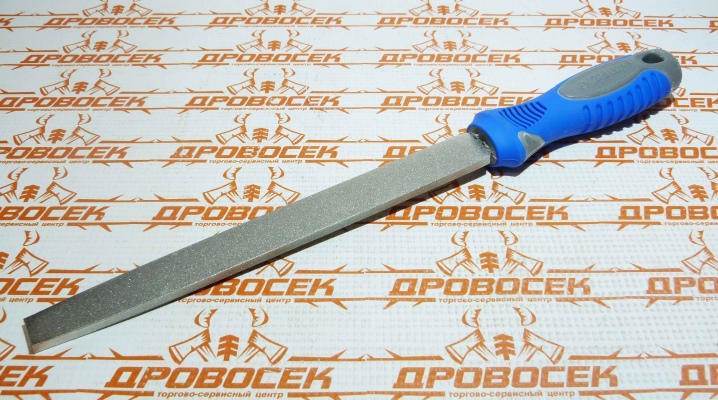
Diamond-coated files are used in everyday life and at work. With their help, you can carry out the processing of stone, metal and other materials. There are different types of tools, so the choice depends on the characteristics of the work and specific tasks.



What is it and what is it for?
The file is used for layer-by-layer processing of materials. With this tool, filing of a surface or part is performed in order to remove excess and give the object the desired shape. There are also varieties that are used to sharpen knives and saw chains.
The design of the tool is simple. It has a working part, as well as a handle that is attached to the shank. In production, alloyed chromium steels and unalloyed improved ones are used, the strength of the tool depends on the grade of the material. The handles are made of wood or plastic.
The diamond file features a special coating that replaces the cut with cutting teeth. The use of such a tool is advisable when working with hardened steel with a high carbon content and other high-strength materials. The shape of the diamond files coincides with the usual ones that do not have any spraying.


When choosing, you should pay attention to the size of the grains - the sawdust speed and the degree of roughness after processing depend on this.
Species overview
Different sprayed tools can vary significantly in performance, even though they are all used for metalworking. Some are needed for roughing, others for finishing sanding or filing small parts. According to GOST 1513-67, the files must be marked with the main parameters. Tools can be divided into groups according to a number of characteristics.
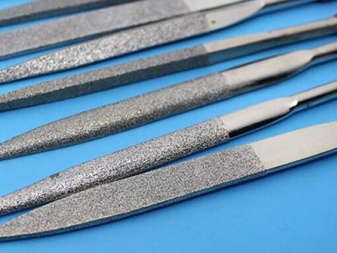

By form
The profile view indicates the purpose for which this or that file is suitable. Acceptable forms are established by the state standard. There are quite a few of them, which allows you to choose tools for different stages of work.
Flat, with a blunt nose:
-
have a rectangular shape;
-
have 4 edges, 2 of which are wide, and the rest are narrow;
-
suitable both for processing flat surfaces and for sawing grooves and other hard-to-reach places.
There are also flat file files with a sharp nose. They are distinguished by a different shape of the tip of the working part, otherwise they have the same features as obtuse-angled products.

Rhombic:
-
the upper corners are blunt;
-
there are diamond-shaped edges;
-
field of application - processing of parts with versatile angles.
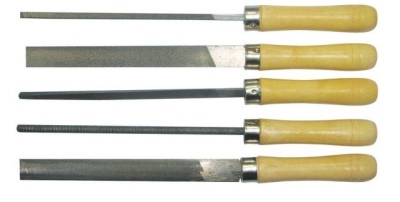
Square products are needed for filing rectangular grooves. All the edges of the tool are working.
Triangular files are of two types:
-
sharp-nosed - suitable for processing external grooves in small parts, all faces are involved in the work;
-
obtuse - they can have either one working side or all three; the latter is more popular.

Round instruments usually have a sharp tip. They are suitable for turning relief elements. Similar in shape - oval models, they can handle rounded parts.
To size
The parameters of the product are usually indicated in the marking. It can contain three numbers, for example, one of the popular sizes 140x70x3, where 140 mm is the length of the product, and 70x3 mm is its section. And also files with parameters 140x50x3 are in demand.In some forms, the section is indicated by one number, for example, a 4 mm round file.
The length of the products can be different, but most often tools are used for 80 mm, 120 mm, 160 mm. If necessary, for work, you can purchase a file from 100 mm to 450 mm.

By grain level
Depending on the purpose, the cover of the file can be different. Pay attention to the density of the grains. If there are few of them, then after processing the product will be rough, and with a fine-grained file, you can make the surface smooth. For convenience, color markings are applied to the handle of the tools:
-
red - the density of grains is from 160 to 80 units;
-
blue - grain size ranging from 80 to 55;
-
if there is no marking, then the coating can have 50-28 grains per 1 cm2.
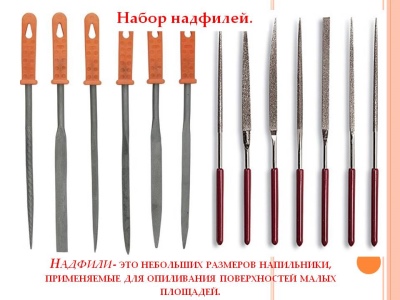
You can use different files one after the other, from coarse to fine, to give the product the desired look.
Popular manufacturers
Diamond files are produced by domestic and foreign companies. It is better to give preference to trusted brands that have earned a good reputation.
-
"Bison". The Russian company has been producing hand and power tools for over 20 years. Diamond coated files are available in the Expert and Master series. The tools are sold in sets and individually. Available in different shapes and sizes.
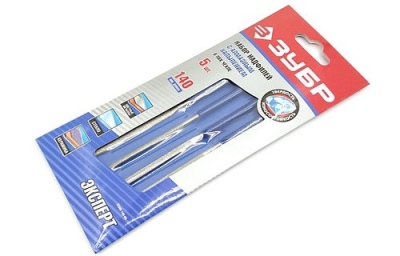
- Vallorbe. Manufactured in Switzerland, the company was founded in 1899. The tools are made of high quality alloy steel. The assortment includes files from 50 cm in length.

- Stayer. This is a German brand. In the product catalog, you can find tools of various shapes - square, round and semicircular, triangular. Products are sold individually and in sets, most of them have plastic handles.

- Matrix. The brand belongs to the Germans, but production is located in China and Taiwan. Among the products there are files of all common sizes: 80 mm, 150 mm, 200 mm and others.

- Vira. Russian company, on the market since 2004. Specializes in construction and locksmith tools. The products comply with GOST, and the manufacturer also complies with the German DIN standard. Files are made from strong high carbon steel.

Nuances of choice
The tools are sold individually and in sets. If you need several files for different types of work, then it would be advisable to purchase a set. As a rule, it includes 6-10 files with the most popular shapes and sizes.
-
Kit from the manufacturer Sparta with the number 158255. Includes 10 instruments. Suitable for finishing steel, ceramics, glass.
-
Stayer Bundle - 1603-10-H6_z01. It includes 6 files with comfortable handles. They can be used when working with wood or metal.
The cost of the kits depends on the number of instruments. Good options can also be found at affordable prices ranging from 300-500 rubles per set, but it should be borne in mind that they are designed for household, not professional use. Such tools are suitable for repairs on the farm, for sharpening knives, processing hooks.


In addition to knowing the technical characteristics necessary for choosing the right file, you should also pay attention to a number of nuances that will help to assess the quality of the product.
-
Examine the instrument from all sides. The shape must be correct, without distortion. During hardening, the products may bend - this is considered a defect, so you do not need to take such a copy.
-
The presence of rust and dirt on the surface is unacceptable. A good tool will have an even color on the steel.
-
Cracks and other defects are unambiguous defects, but sometimes they are not visible. Tap a hard surface with a needle file to determine if there is any internal damage. If you hear a clear sound, without bounce, then everything is in order.
-
It is important that the spraying is of good quality. Take two tools and, with light pressure, slide one of them over the other.Good spraying will not wear off from such exposure, will not begin to crumble and will not change color.

Pay attention to the handle of the tool as well. It should be comfortable, not slippery, about 1.5 times longer than the shank. If you choose between wooden and plastic options, then the latter is preferable. They are lighter, do not crack or rot, and do not deteriorate from contact with oil or gasoline.
If the handle is damaged, you can find suitable replacement parts in file stores. Although some craftsmen make them on their own. Handles are made from wood and even from old toothbrushes.

Instrument care
File sets are usually sold in a plastic or soft case, which is also suitable for storing tools. Do not pile them up as friction can cause them to become dull. If you are making your own storage case, there should be separate slots for each file.
Also, remember to clean your tools after work, keep them dry to avoid rust. You can use charcoal to remove oil from the file. Rub it over the surface, and then go around with a brush.
When buying a new file, load it gradually. Start with softer materials and work your way up to harder metals. This will dull the teeth less.


These simple steps can help you extend the life of your files.
Description of diamond files and the secrets of their choice in the video below.













The comment was sent successfully.